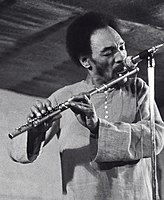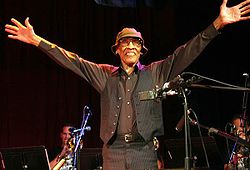
Ray Anderson is an American jazz trombonist. Trained by the Chicago Symphony trombonists, he is regarded as someone who pushes the limits of the instrument, including performing on alto and soprano trombone. He is a colleague of trombonist George E. Lewis. Anderson also plays sousaphone and sings. He was frequently chosen in DownBeat magazine's Critics Poll as best trombonist throughout the late 1880s and early 1890s.

Rashied Ali, born Robert Patterson, was an American free jazz and avant-garde drummer who was best known for performing with John Coltrane in the last years of Coltrane's life.

Roy Owen Haynes is an American jazz drummer. He is among the most recorded drummers in jazz. In a career lasting over 80 years, he has played swing, bebop, jazz fusion, avant-garde jazz and is considered a pioneer of jazz drumming. "Snap Crackle" was a nickname given to him in the 1950s.

Evan Shaw Parker is a British tenor and soprano saxophone player who plays free improvisation.
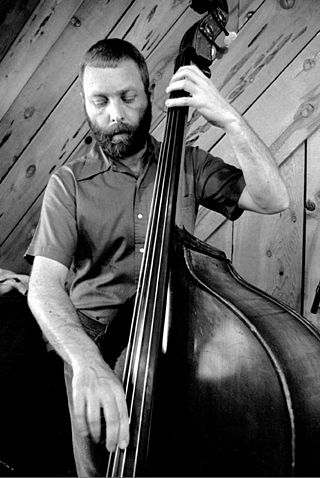
David Holland is an English double bassist, bass guitarist, cellist, composer and bandleader who has been performing and recording for five decades. He has lived in the United States since the early 1970s.

Kenneth Vincent John Wheeler, OC was a Canadian composer and trumpet and flugelhorn player, based in the U.K. from the 1950s onwards.

Cecil McBee is an American jazz bassist. He has recorded as a leader only a handful of times since the 1970s, but has contributed as a sideman to a number of classic jazz albums.

Barry Altschul is a free jazz and hard bop drummer who first came to notice in the late 1960s for performing with pianists Paul Bley and Chick Corea.
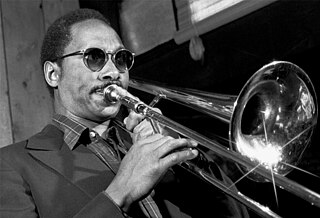
Julian Priester is an American jazz trombonist and occasional euphoniumist. He is sometimes credited "Julian Priester Pepo Mtoto". He has played with Sun Ra, Max Roach, Duke Ellington, John Coltrane, and Herbie Hancock.

Herman Davis "Dave" Burrell is an American jazz pianist. He has played with many jazz musicians including Archie Shepp, Pharoah Sanders, Marion Brown and David Murray.
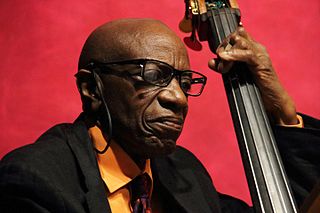
Reginald "Reggie" Workman is an American avant-garde jazz and hard bop double bassist, recognized for his work with both John Coltrane and Art Blakey.

Gary Thomas is an American jazz saxophonist and flautist, born in Baltimore, Maryland. He was a member of Jack DeJohnette's Special Edition band and has worked with John McLaughlin, Herbie Hancock, Pat Metheny, John Scofield, Jim Hall, Dave Holland, Greg Osby, Wayne Shorter, Ravi Coltrane, Cassandra Wilson, Wallace Roney, Steve Coleman, and Miles Davis.

Rashid Bakr is an American free jazz drummer.
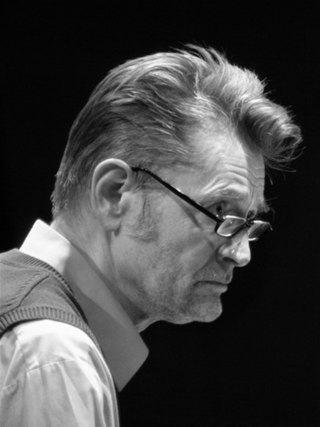
Alexander von Schlippenbach is a German jazz pianist and composer. He came to prominence in the 1960s playing free jazz in a trio with saxophonist Evan Parker and drummer Paul Lovens, and as a member of the Globe Unity Orchestra. Since the 1980s, Von Schlippenbach has explored the work of more traditional jazz composers such as Jelly Roll Morton or Thelonious Monk.

Conference of the Birds is an album by the Dave Holland Quartet, recorded on 30 November 1972 and released on ECM the following year—Holland's debut as bandleader and fourth project for the label. The quartet features alto saxophonist Anthony Braxton, tenor saxophonist Sam Rivers, and percussionist Barry Altschul.
Thomas Henry Lowther is an English jazz trumpeter who also plays violin.

Reunion: Live in New York is a live album by the Sam Rivers trio, featuring Rivers on saxophone, flute, and piano, Dave Holland on bass, and Barry Altschul on drums. It was recorded on May 25, 2007, at Columbia University's Miller Theatre in New York City, and was released in 2012 as a double-CD set by Pi Recordings.

The Quest is a live album by Sam Rivers on which he is accompanied by double bassist Dave Holland and drummer Barry Altschul. It was recorded on March 12 and 13, 1976, during the Rassegna Internazionale Jazz at the Palazzo dello Sport in Milan, Italy, and was initially released later that year by Red Records. It was reissued the following year by Pausa Records, and was also reissued by Fabbri Editori in a variety of forms over the next four years.

Paragon is an album by Sam Rivers on which he is accompanied by double bassist Dave Holland and drummer Barry Altschul. It was recorded on April 18, 1977, at Davout Studio in Paris, and was released later that year by Fluid Records. In 2015, it was reissued as a digital download by Rivers's RivBea Music.
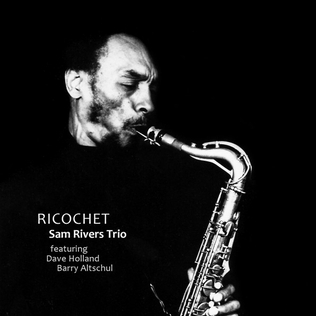
Ricochet is a live album by the Sam Rivers Trio, led by multi-instrumentalist and composer Rivers, and featuring double bassist Dave Holland and drummer Barry Altschul. Consisting of a single 52-minute track, it was recorded on January 12, 1978, at the Keystone Korner in San Francisco, California, and was released in 2020 by NoBusiness Records as volume 3 of the Sam Rivers Archive Series.
